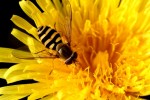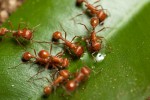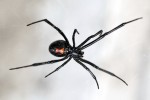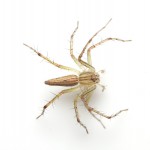As the weather warms up it is likely that we will be working outdoors, side-by-side with some potentially hazardous insects. Here are some samples of bothersome bugs that could result in serious health hazards.
 Bees, Wasps, and Hornets are found throughout the United States. Their nests and hives may be found in trees, under roof eaves, or on equipment such
Bees, Wasps, and Hornets are found throughout the United States. Their nests and hives may be found in trees, under roof eaves, or on equipment such
as ladders.
Some ways to prevent stings on the job:
- Wear light-colored clothing, covering as much of the body as possible.
- Avoid perfume scented toiletries.
- Remain calm and still if a single stinging insect is flying around. If attacked by several stinging insects at once, run away.
- If a bee comes inside your vehicle, stop the car slowly, and open all the windows.
If a worker is stung:
- Have someone stay with the worker to be sure they do not have an allergic reaction.
- Wash the sting area with soap and water.
- Remove the stinger by wiping gauze over the area or by scraping a fingernail over the area. Never squeeze the stinger or use tweezers.
- Apply ice to reduce swelling. Do not scratch.
 Fire Ants are aggressive and inject venom. They are found mostly the southeastern United States, with limited presence in New Mexico, Arizona, and California.
Fire Ants are aggressive and inject venom. They are found mostly the southeastern United States, with limited presence in New Mexico, Arizona, and California.
Some ways to prevent bites on the job:
- Do not disturb or stand on, or near, ant mounds.
- Be careful when lifting items (including animal carcasses) off the ground, as they may be covered in ants.
- Fire ants may also be found on trees or in water, so always look over the area before starting to work.
If a worker is bitten:
- Wipe off ants briskly, as they will attach to the skin with their jaws.
- Antihistamines may help.
- Take the worker to an emergency medical facility immediately if a bite causes severe chest pain, nausea, severe sweating, loss of breath, serious swelling, or slurred speech.
 Black Widow spiders are common in southern and western areas of the United States. They are usually found in woodpiles, under eaves, fences, and other areas where debris has accumulated. They may also be found living in outdoor toilets where flies are plentiful.
Black Widow spiders are common in southern and western areas of the United States. They are usually found in woodpiles, under eaves, fences, and other areas where debris has accumulated. They may also be found living in outdoor toilets where flies are plentiful.
 The Brown Recluse spider is commonly found in the midwestern and southern states. They are usually found in dry, sheltered areas such as underneath structures, logs, or in piles of rocks or leaves.
The Brown Recluse spider is commonly found in the midwestern and southern states. They are usually found in dry, sheltered areas such as underneath structures, logs, or in piles of rocks or leaves.
Some ways to prevent bites on the job:
- Inspect or shake out any clothing, shoes, towels, or equipment before use.
- Wear protective clothing.
- Store apparel and outdoor equipment in tightly closed plastic bags.
If a worker is bitten:
- Stay calm. Identify the type of spider if possible.
- Wash the bite area with soap and water.
- Apply a cold cloth or ice to reduce swelling.
- Elevate bite area if possible.
- Do not attempt to remove venom.
- Notify your supervisor.
- Immediately seek professional medical attention.
Employers should protect their workers from stinging insects by training them about: their risk of exposure, insect identification, how to prevent exposure, and what to do if stung. Workers with a history of severe allergic reactions to insect bites or stings should consider carrying an epinephrine auto injector (EpiPen) and should wear a medical identification bracelet or necklace stating their allergy. For more detailed information on insect safety on the job site please visit: https://www.cdc.gov/niosh/topics/insects/
